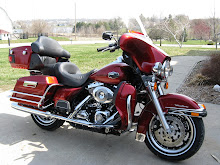The FDA just approved the use of VIVITROL, a once a month intramuscular injection for opiate addicts. The medication is an opiate antagonist (blocks opiate receptors in the brain). Vivitrol cannot be abused. It is not addictive. It cannot be gotten except in a doctors office. You cannot take it home. You go in once a month for the shot. It has an 86% rate of success.
YOU HAVE TO BE TOTALLY DETOXED FROM ANY OPIATE BEFORE YOU CAN RECEIVE THE TREATMENT. NO SUBOXONE, NO METHADONE, NO OXY'S, NO HEROIN, NO CODIENE, NO OPIATES AT ALL.
BUT....this might save our children. Vivitrol Website, with Doctor Locator
Subscribe to:
Post Comments (Atom)












8 comments:
I have been excited about this for months! However, I will note that CNN did a story on this and featured a guy from our state that was on the trial with it. I reached out to him via email to tell him what an inspiration he was and to keep up the good work. He never responded and has since passed away...I don't know all the details so I don't know whether to be discouraged by this or not??? Does anyone have a success story to report?
They use this at the treatment center Keven is at. They call it Naltrexone but I checked and its the same thing. I think it works but I did hear quite a few of the residents complaining about it making them feel sick and tired. Anything is worth a try.
Well, imho, just one patient's success or not, is far far too little to make any decisions on. Doubly so, when you (appear to) have so little details on the case.
If it was a success, that's great, but maybe it was due to the drug being just the right one for him. And if it didn't work out, maybe it was due to him having additional, complex health issues, which you might not have.
I know how persuasive it can be, to try new drugs or treatment, after you've heard a few fellow patients sing it's praises. Or to reject treatment following a few negative reports. But as I wrote above, without a lot more info, it's nigh on impossible to know whether the treatment was matched up well with the patients.
Myself, I try to work out what are the root causes of my addiction? What started it all off? What is keeping it going? Then I search for patients who appear to have the same root causes, the same things fuelling it. And what has worked for them?
e.g I have a severe chronic illness that results in extreme exhaustion. Simply taking a bath tires me out so much I must go straight back to bed to recover. Otherwise I risk hypothermia
and dangerously low blood pressure
Most notably, the more exhausted I become, the worse I my pain becomes.
My specialists (in my chronic health condition, not addiction specialists), have told me time and again, that one of my main mistakes, is to keep doing too much, energy wise.
And yet, because, for many drug addicts, finding something constructive to fill up their time, has proved to be very helpful, I have frequently had it recommended. It was even forced upon me while in a ''medically supervised'' detox!
Understandably, anything that worsens my exhaustion and my chronic health condition*, worsens my pain, and drives me towards more illicit opioid use. So, for me, increased activity, despite the fact that I loved my yoga, woodwork, t'ai chi, and art classes, made me much worse in the long run.
I could have read reports from hundreds, thousands of fellow drug addicts, telling me how their adult education classes formed the backbone of their lasting recovery.
And yet, for me, no matter that I enjoyed them (while I lasted!) tremendously, they were actually my undoing. They actually fuelled my self medication with opiate based painkillers.
I guess then, my advice is, try not to spend too much time reading about what helped fellow addicts, -unless-, they also have similar problems that have caused, or are fuelling their addiction.
A recovered addict has said to me that my ego is making me think I am so blooming special, and that I need treatment that is ''just for me''. He said that, basically, if it works for lots of other addicts, then it's more than good enough, and will likely work for me, -if- I want it to!
His argument sounds so persuasive....Maybe my ego/addict brain is fooling me, and what works for many others will work for me if I give it a go.
But then again.....aren't we supposed to be treating the root cause of our addictions? And if the root cause is actually -over-doing activities, then how is the popular treatment of taking up more activities, going to help someone who needs to do less, not more?
Therefore, I advise not just following the herd. But following the root cause, the fuel to your addiction fire. And if it turns out that what caused, and what is fuelling your fire -is- the same as most other addicts, then by all means, seek to try the same treatment as they advise.
But equally, if, like me, you and/or your specialists believe that the root cause/the fuel for your addiction is markedly different to most fellow addicts. Then imho, it's quite possible that what worked so well for them, may not be for you after all.
You may still wish to try it, after all, if you don't give it a go, you'll never know. But imho, it would be sensible to proceed with caution.
Hope this helps :) Best wishes, anon :)
THE TRUTH ABOUT M.E
===================
(sometimes wrongly called C.F.S - Chronic Fatigue Syndrome. They're different but usually lumped together)
* = Long explanation of my chronic health condition (because there is -so- much misunderstanding and misinformation about it)
Besides from opioid addiction, and preceeding it, I have what is called Myalgic Encephalomyelitis, aka M.E.
M.E. is recognised by the W.H.O. (Word Health Org) as a genuine, dysfunction of the neurological, endocrine, and immune systems. Not just a little tiredness or laziness! I have had the severe and painful subtype for almost half my life (14yrs). The untreated (and totally disbelieved) severe chronic pain caused by my M.E is what eventually drove me to start self-medication with opioids.
Many of us severely affected patients have over 25 different symptoms. Mine include such low blood pressure that my doctor says he is amazed I can still stand up, lol! I also have temporary blindness, ''fits'', and loss of consciousness upon standing up (unless I take it verrrrry slowwwwly, yawn!). Also double incontinence, and memory loss so severe I sometimes forget where I live. Exhaustion so bad it can take 20min to drum up the energy required to turn myself over in bed. This is not ''just a bit tired''! (many M.E patients were athletes or worked in heavy manual labour jobs before becoming ill).
Did you know? Some scientists believe is is caused by a virus that is related to Polio. Or, a retrovirus, the most famous of which is HIV, the virus that is believed to cause AIDS. In fact, M.E. was originally named ''a typical Polio''. Polio patients were also mismanaged, by forcing them to ignore their body's messages, and over exercise. Resulting in severe and often permanent damage. M.E, polio, diabetes, and M.S. were all once claimed to be caused by hysteria/ exist solely in the mind, by both public and doctors alike.
Many doctors recommend solely psychologicaly based treatments, such as C.B.T. This is despite the fact that many countries, the U.K included, have now banned M.E patients from donating their blood, for life (even if they feel they have fully recovered). Imho, it is illogical to be suggesting that a psychological treatment (and nothing else) is the cure for the very same illness that now bars you from donating blood for life!
Last but not least, in the U.K, there are secret government files on their management, or mismanagement of M.E, which are locked from public access until 2071 - this, I am told, is double the standard length of government files from being kept from public viewing.
THANK YOU FOR READING THE TRUTH ABOUT M.E.- FROM SOMEONE WHO HAS BEEN THERE, GOT THE NEBULISER, NAPPIES, WHEELCHAIR, SUPPLEMENTS AND BLOOD TESTS TO PROVE IT (< Google DR MYHILL + MITOCHONDRIAL FUNCTION TEST)
Dawn just commented on this drug a couple days ago. I am confused how it can be an opiate agonist and not be addictive? Suboxone is an opiate agonist as well and it is most definitely addictive. I am going to look into it but more just out of curiosity. I am done looking for my sons "cure". He needs to find it himself.
madyson, its not the naltraxone in suboxone thats addictive its the bupe. even then suboxone is nowhere near as hard as methadone to get off. we've had the injections/implants/pills for naltraxone for a while in the uk, they are brilliant if you do want to get clean, otherwise you find it easy to stay clean cos u know there really is no point in using, then when you finish the treatment its straight back to the heroin. it obviously doesn't do any harm, even if it keeps someone clean for a year its better than using. but its not a miracle cure, in the end you are always gonna have to rely on your self, and thus is the undoing of many an addict. I can't describe the feeling of knowing you cant do it then the knowledge that you can is pretty much hard to resist. although you've created a life that supports being clean, its been built without the need for any kind of "willpower" required to maintain it...its a short term solution if the desire to quit isn't overwhelming.
Leanne x
This is a very exciting medication.
Thank you for sharing this information. The information was very helpful and saved a lot of my time.
Post a Comment